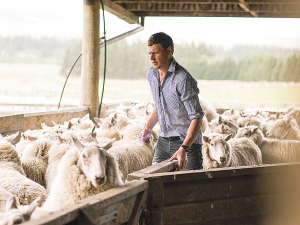Maximising triplet survival
High quality feed, reduced stocking rates and shelter will all help enhance triplet lamb survival and ultimately benefit the bottom line.
 Farmers have the next few weeks to lift the condition of their lighter ewes before the ram goes out. Photo: Kieran Scott.
Farmers have the next few weeks to lift the condition of their lighter ewes before the ram goes out. Photo: Kieran Scott.
Sheep farmers in many parts of the country have the next few weeks to lift the condition of their lighter ewes before the ram goes out.
Body Condition Scoring (BCS) pre-tupping allows farmers to identify any ewes that fall outside the optimum BCS 3-4. These can be then managed strategically to either lift or reduce body condition.
This could include running lighter-conditioned ewes on priority pasture or forage crops and/or supplementary feeding.
Numerous studies have shown that ewes with a BCS of 3-4 at lambing give birth to heavier lambs, are better mothers, have more milk and wean heavier lambs with a higher survival rate.
To determine the body condition score, place a hand behind the ewe's 13th rib. Using of the balls of the fingers and thumbs, feel the backbone with the thumb and end of the short ribs with the finger tips behind the last rib.
Feel the muscle and fat cover around the end of the short ribs and backbone.
So, what does BCS3& feel like?
The vertical processes are smooth and rounded; the bone is only felt with pressure. The horizontal processes are also smooth and well-covered; hard pressure with the fingers is needed to find the ends. The loin muscle is full, with a moderate fat cover.
The actual numbers are not as important as consistency, so it is preferable for just one or two people to be doing the scoring.
More information about Body Condition Scoring: https://beeflambnz.com/search?term=Body+Condition+Scoring
South Waikato farm manager Ben Purua’s amazing transformation from gang life to milking cows was rewarded with the Ahuwhenua Young Maori Farmer award last night.
Bankers have been making record profits in the last few years, but those aren’t the only records they’ve been breaking, says Federated Farmers vice president Richard McIntyre.
The 2023-24 season has been a roller coaster ride for Waikato dairy farmers, according to Federated Farmers dairy section chair, Mathew Zonderop.
Ministry for Primary Industries (MPI) director general Ray Smith says job cuts announced this morning will not impact the way the Ministry is organised or merge business units.
Scales Corporation is acquiring a number of orchard assets from Bostock Group.
Family and solidarity shone through at the 75 years of Ferdon sale in Otorohanga last month.